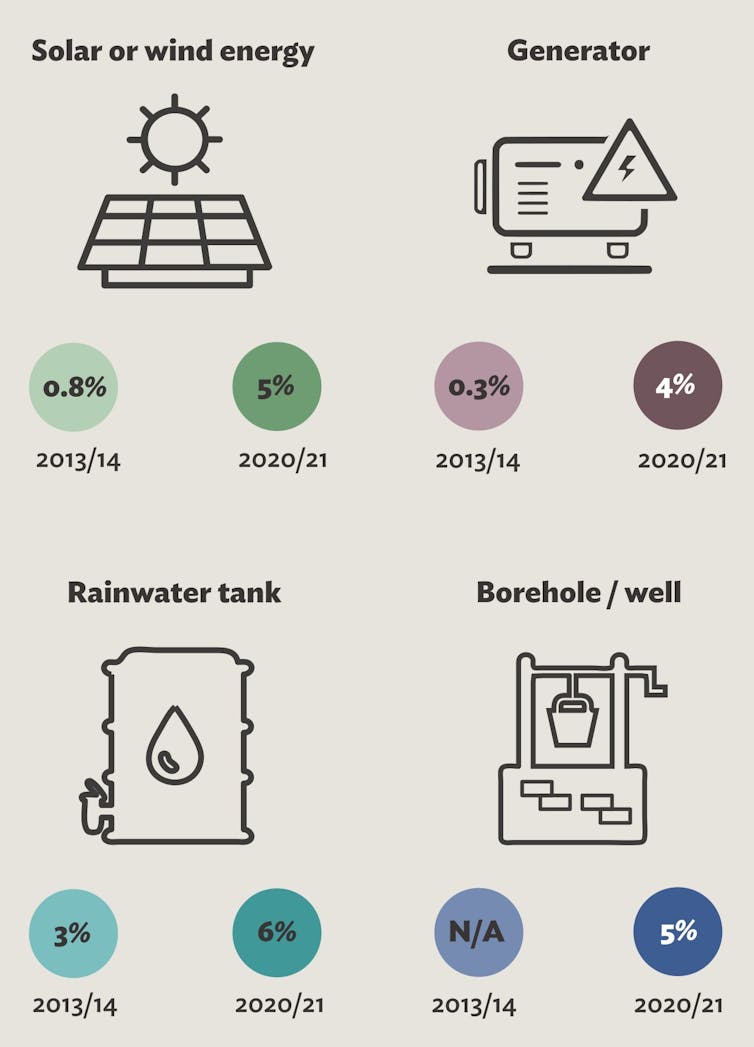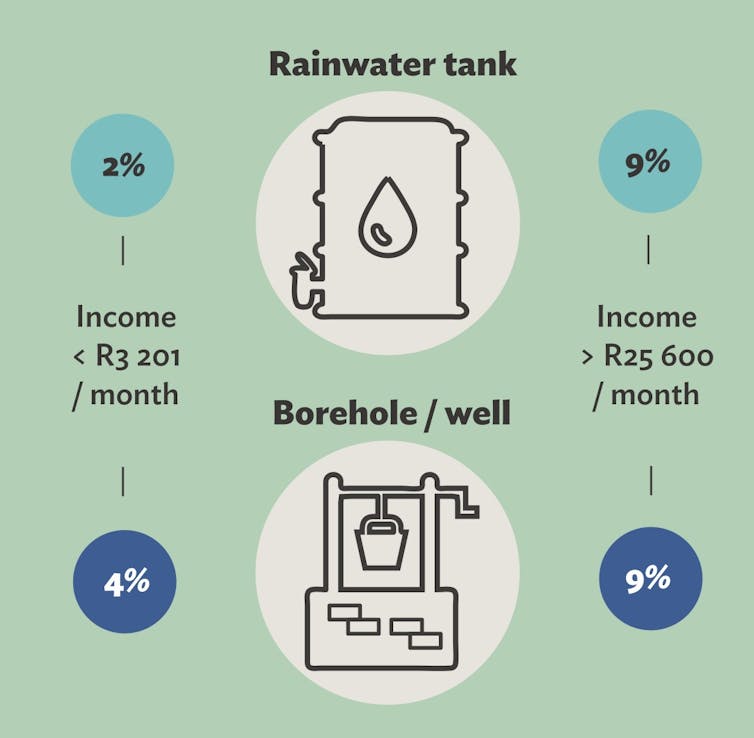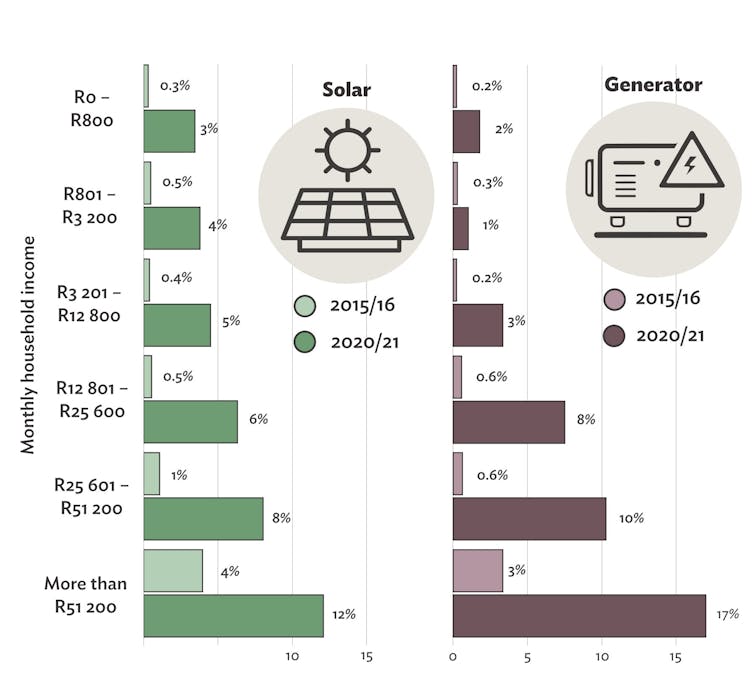South Africa’s present electrical energy disaster has been described as “an ideal storm”. Various elements have converged to succeed in this level: an ageing and inadequately maintained fleet of coal energy stations, delays in upgrading the Koeberg nuclear energy station and important failures on the lately constructed Medupi and Kusile coal energy stations.
Because the starting of 2022, energy utility Eskom’s lack of ability to satisfy the nation’s electrical energy demand has resulted in unprecedented loadshedding (scheduled energy cuts). In 2022, electrical energy interruptions totalled 3,775 hours over 205 days. The scenario nearly actually is not going to enhance any time quickly.
On the identical time, Gauteng – South Africa’s most populous province and its financial hub – has skilled essential water provide points. In late 2022 and early 2023, the mixed influence of warmth waves, intermittent pumping of water due to electrical energy interruptions and infrastructure failure has led to demand outstripping water provide. Residents of Gauteng’s largest municipalities have skilled near-daily low water stress or water cuts.
Learn extra:
Energy cuts in South Africa are taking part in havoc with the nation’s water system
Many non-public people and companies are investing in different electrical energy and water sources. The precise quantity is unsure – most programs are not registered. Different investments embody water tanks, boreholes, photo voltaic panels and diesel mills. These options price anyplace from R4,000 (about US$220) for rainwater tanks and as much as R180,000 (nearly US$10,000) for a borehole.
The price of putting in residential photo voltaic panels is anyplace from R8,000 (about US$440) to R10,000 (round US$550) per kWp (a measure of how excessive the panels’ energy output is). Inverters and batteries are additionally expensive. Even with financing choices, most households can’t afford alternate options.
These investments are usually efforts to take care of a stage of normality and to outlive by means of unreliable water and electrical energy provide. However the cumulative impact of those particular person actions might have important penalties for inequality and repair provision for the poor. South Africa is already one of the unequal nations on the planet.
Poor individuals are much less in a position to afford alternate options for energy and water. There’s additionally the danger that municipalities will steadily be unable to cross-subsidise companies to the poor as they lose income from rich shoppers.
Social justice issues have been on the forefront of South Africa’s simply transition from coal-based to renewable electrical energy technology. However this has largely centered on the labour drive and affected communities. Much less consideration has been paid to the justice implications of electrical energy distribution.
Regardless of the potential destructive penalties of personal investments in off-grid water and electrical energy, these might be mobilised to assist deal with the present crises relatively than exacerbate it. Nonetheless, this requires re-imagining the function of the state and residents, transforming municipal funding fashions, and inspiring non-public traders to assist the grid in numerous methods.
What do the High quality of Life information inform us?
In early February 2023 we used survey information from 2013 to 2021 to point out how Gauteng households have been investing in different electrical energy and water provision. We examined who was accessing these different sources and who was not.
The info for this undertaking was drawn from the Gauteng Metropolis-Area Observatory (GCRO)‘s common High quality of Life survey, which is designed to collect a consultant pattern of Gauteng residents. It consists of questions on demographics, dwelling situations and socio-economic circumstances. All of the datasets are freely accessible to obtain by means of the College of Cape City’s DataFirst platform.
The info reveal that entry to different electrical energy and water sources has elevated over time. In 2013/14, solely 0.8% of residents reported gaining access to photo voltaic or wind power, whereas 0.3% had a generator.

GCRO
By 2020/21, these figures had jumped to five% and 4%, respectively. Regardless of this improve, solely a small minority of Gauteng residents (about 1 in 20) have entry to different water and electrical energy.
Prosperous households are proportionately extra more likely to spend money on different electrical energy and water sources than poorer households. In 2020/21, 2% of respondents with a month-to-month family earnings under R3,201 (round US$177) had a rainwater tank. Some 4% of this earnings group had a borehole or effectively. In distinction, 9% of the respondents within the larger earnings teams – a month-to-month family earnings over R25,600 (about US$1,415) – had entry to a rainwater tank or borehole.

GCRO
The uneven improve in entry to different electrical energy is especially notable. Entry to solar energy grew from 0.3% in 2015/16 to three% in 2020/21 for households incomes lower than R800/month. For the best earnings group (month-to-month family earnings greater than R51,200), entry to photo voltaic elevated from 4% to 12% over the identical interval.

GCRO
Implications for a simply transition
The hole is clearly widening between prosperous households who can protect themselves from electrical energy and water interruptions, and poorer households who can’t afford to take action.
And this hole might widen additional due to how municipal companies are financed. Beneath the present funding mannequin, municipalities rely on income from fundamental service provision (electrical energy, water and refuse) to fund their mandated actions. They use the income from industries, companies and rich shoppers to cross-subsidise companies for the poor.
This mannequin has been critiqued for being unsustainable and creating perverse incentives for municipalities to raise tariffs and encourage excessive customers to maintain consuming electrical energy. Nevertheless it a minimum of ensures entry to companies for poor households.
The present transfer by residents and companies in direction of self-generated electrical energy has doubtlessly dire penalties for municipalities’ skill to make sure fiscal stability and equitable entry to companies.
It additionally has some technical drawbacks. Non-public investments have the potential so as to add pressure and complexity to the grid. Grid-charged battery programs improve electrical energy consumption and post-loadshedding peaks. Photo voltaic photovoltaic installations cut back stress on the grid through the day. However, they go away the night peak unchanged. Energy crops should proceed producing electrical energy in extra through the daytime demand to make sure they will meet the night peak.
Non-public borehole installations might trigger uneven depletion of aquifers. They might additionally negatively have an effect on groundwater administration and undermine the provision of those water sources for broader society.
Mobilising non-public investments
Nonetheless, there are alternatives to harness non-public investments to deal with the present electrical energy and potential future water crises.
Municipalities are starting to provide households and companies incentives to promote their extra energy again to the grid. This might cut back the price of electrical energy for municipalities, maximising their skill to cross-subsidise service supply for the poor.
The place households and companies have invested in batteries, they may retailer photo voltaic power and promote it again to the grid through the night peak.
Along with the authors, the Off-grid Cities undertaking workforce members embody: Fiona Anciano, Charlotte Lemanski, Margot Rubin, Laurence Piper, SJ Cooper-Knock, Temba Middelmann, Brian Murahwa, Joanna Watterson, Eyong Tarh, Miguel Isaac and Zackeen Thomas.




